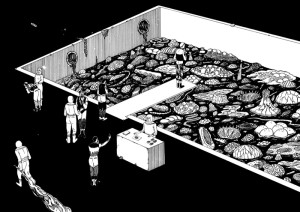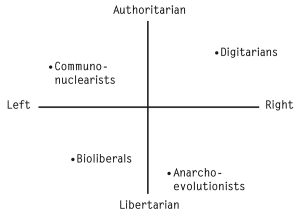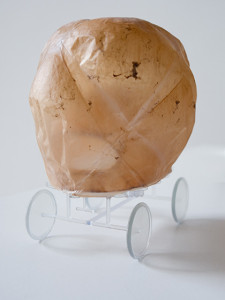
Bioland’s more extreme attractions
I first learned of Dunne & Raby in 2011, during their MoMA exhibition, Between Reality and the Impossible, exploring urban foraging and the concept of synthetic digestive systems to accommodate rising food insecurity. I instantly became fascinated by their futuristic and evolving examination of heterotopias and the dystopian earth. Two years ago their team created a “design fiction”, or fictional scenario fabricated to frame questions surrounding our current social values and decisions. Their project, entitled, United Micro Kingdoms, depicts four “super shires” within the United Kingdom, each extrapolating today’s buzzworthy topics and innovations to a fantastical degree, with a special emphasis on the relevance of transportation to social and economic development. Initially, each theme excites the viewer by presenting imaginative possibilities – but then the dark undertones of opportunistic exploitation, repetition and misery set in.

Within the UK, four micro kingdoms exist; Digitarians, Communo-Nuclearists, Bioliberals, and Anarcho-Evolutionists. The Digitarians, which Dunne & Raby cite as “the most dystopian, yet familiar of all the micro kingdoms”, pursue technology and big data to ensure transparency and an efficient economy governed only by algorithms. Their digicars heavily hint at combinations of Google’s self-driving cars with Uber’s seamless GPS connectivity to swiftly move goods and services, described as having the minimal level of comfort and pleasure found when packed into an overcrowded elevator. The concept reminds me of Ideo’s Automobility project, offering portable workstations through their Work on Wheels (WOW) design.
The Communo-Nuclearists embody a no-growth society with limitless nuclear power while living in constant fear of [I think, nuclear] attack or accident. For this reason, their communistic and centralized society is supported upon a moving train where they are “voluntary prisoners of pleasure, free from the pressures of daily survival”. The Anarcho-Evolutionists believe “humans should modify themselves to exist within the limits of the planet rather than modifying the planet to meet their ever growing needs”. This concept seemed to have the most crossover with the 2010 MoMa presentation, with an emphasis on DIY biohacking and added elements of self-government and social Darwinism.
My personal favorite, the Bioliberals, relish biotechnology and the opportunities it has created. Driving around in organic loaves of bread, this society “enhances nature to meet growing human needs – but people also adjust their needs to match available resources”. The population is categorically farmers, cooks and gardeners, of food – as well as products. After considering the other social microcosms presented, either the slower pace or the possibility of enjoyment within the Bioliberal world really resonates. Either that or this description of their cars, “the resulting cars are bulky, messy, smelly and made out of artificial lab-grown skin, bone and muscles, not literally, but in abstracted forms”…

While I highly enjoyed entertaining the ideas presented within the United Micro Kingdoms, each kingdom was ultimately bereft of any art, culture or religion. I wonder if the negative undertones that come through in each representation are heightened because of the emphasis on the mechanical, robotic and essentially, non-human, nature of these societies. Perhaps in Dunne & Raby’s exploration of societal extremes, they are actually saying more about the value of concepts omitted.